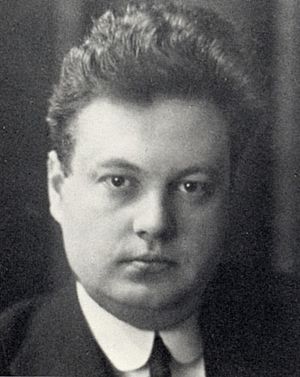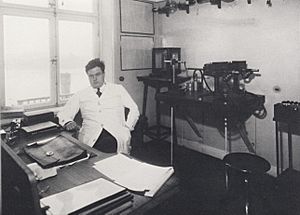Rolf Maximilian Sievert facts for kids
Quick facts for kids
Rolf Maximilian Sievert
|
|
|---|---|
 |
|
| Born | 6 May 1896 Stockholm, Sweden
|
| Died | 3 October 1966 (aged 70) Stockholm, Sweden
|
| Nationality | Swedish |
| Alma mater | |
| Occupation | Medical physicist |
Rolf Maximilian Sievert (born May 6, 1896 – died October 3, 1966) was a Swedish scientist. He was a medical physicist, which means he studied how physics could be used in medicine. His most important work was about how ionizing radiation affects living things.
Contents
About Rolf Sievert
Rolf Sievert was born in Stockholm, Sweden. He became a very important person in the field of radiation safety.
Early Work and Research
From 1924 to 1937, Sievert was the head of the physics lab at Sweden's Radiumhemmet. This was a special hospital that used radiation to treat cancer. Later, he led the radiation physics department at the Karolinska Institute.
He was a pioneer in measuring how much radiation people received. This was very important for using radiation safely to find and treat cancer. As he got older, he studied how small amounts of radiation, received many times, affected the body.
Protecting People from Radiation
Rolf Sievert helped start the International X-ray and Radium Protection Committee (IXRPC) in 1928. He was its first chairman. This group later became known as the ICRP, which still sets rules for radiation safety today.
He also led the United Nations Scientific Committee on the Effects of Atomic Radiation (UNSCEAR). This committee studies how atomic radiation affects people and the environment.
His Inventions and Legacy
Sievert invented several tools to measure radiation doses. The most famous one is called the Sievert chamber. This device helps scientists and doctors know exactly how much radiation is present.
In 1979, a special international meeting decided to name a unit of measurement after him. This unit is called the sievert (Sv). It is the official unit in the SI system for measuring how much radiation affects the human body.
Besides his scientific work, Rolf Sievert also loved insects. He had a very large collection of them. His insect specimens can still be found at the Entomological Museum of Lund University.
See also
 In Spanish: Rolf Sievert para niños
In Spanish: Rolf Sievert para niños
 | Mary Eliza Mahoney |
 | Susie King Taylor |
 | Ida Gray |
 | Eliza Ann Grier |


